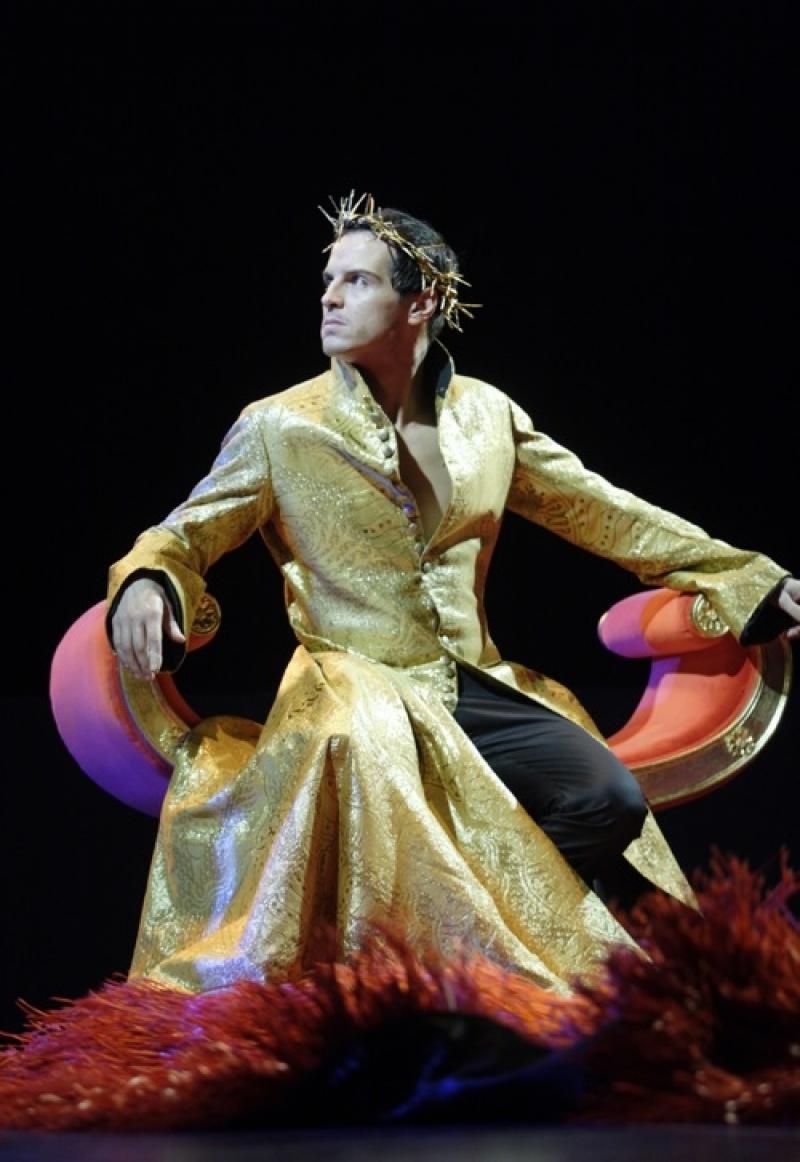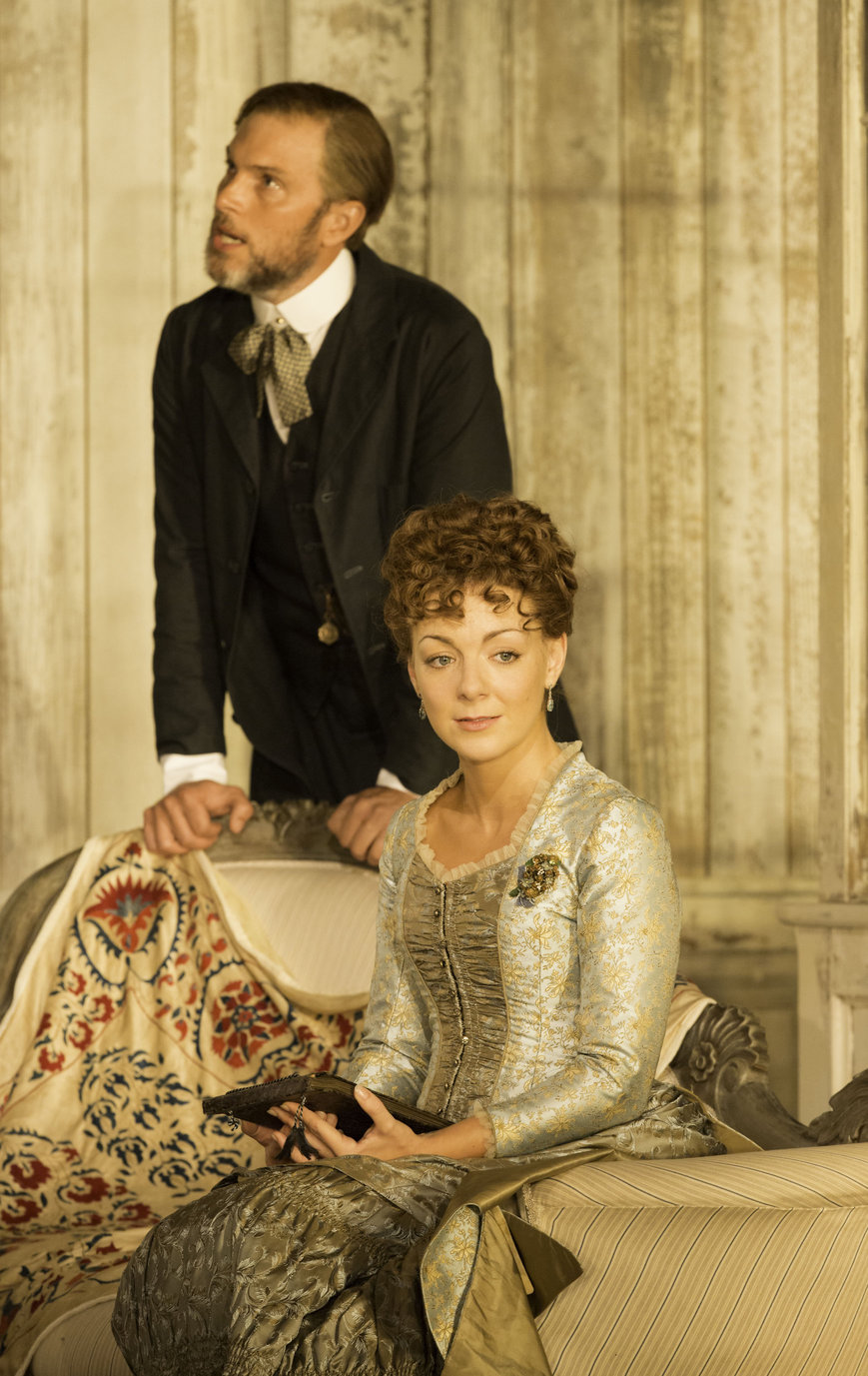Emperor and Galilean, National Theatre | reviews, news & interviews
Emperor and Galilean, National Theatre
Emperor and Galilean, National Theatre
Power and pace help to exhume Ibsen's Romano-Christian epic

Miracles and omens, blind faith and free will: Ibsen’s epic 1873 drama sinks its teeth into some tough, meaty themes.
The action traverses Europe and the Middle East and takes places between 351 and 363 AD. Andrew Scott is Julian, nephew of the Christian Emperor Constantius, played with oleaginous paranoia by Nabil Shaban. Constantinople has become to the young prince a prison, walled in by inflexible and joyless doctrine, the old pagan religion and ritual outlawed. Accordingly, Julian, young, naive, pale and feverishly restless, is lured away to Athens by student rebels, where for a time he declines into aimless hedonism.
He finds the inspiration he longs for when he encounters Maximus of Ephesus (Ian McDiarmid), a silver-haired shamanic seer with a sulphurous whiff of the Mephistophelean. In visions and bloody rituals, Maximus glimpses portents that seem to confirm the prophetic dream of Julian’s mother that he will attain political and military greatness, “a second Alexander”. Seizing the imagination of those who follow him with rhetoric and what appear to be divine phenomena, he ascends to the position of Roman Emperor and recreates himself as a gleaming, burnished, indomitable figure in a golden crown of thorns. He no longer serves any god; he is a god. He has escaped one prison, only to lock himself into another.
Ibsen’s play, written in the wake of the Franco-Prussian war and the fall of the Paris Commune, is rich in allusion – Macbeth and King Lear seem two obvious influences – and it sets in opposition paganism and Christianity, yet finds in both of them, and even in Julian’s ambitions, a common fatalism: a willingness to believe in signs and prophecies, and to submit to the path they appear to indicate. Julian’s rejection of Christian strictures and declaration of his intention to “restore the ecstasy of life” results in a Dionysiac cult; yet there is an equally cultish quality to the acolytes who obsessively follow the flower-strewn corpse of his dead wife – and his aunt – Helena, poisoned by her own brother, Constantius.
Jesus himself was, as Julian sees it, a kind of conjurer: “Take off your magician’s cloak, carpenter’s son!” he cries, anguished. And Christian ritual is horrifically made flesh when a Christian priest, tortured and blinded by Julian’s soldiers, tears open his own chest and urges his tormentors, “Gorge yourself on my blood, now that I feast on Jesus Christ.”
 Kent’s staging is full of restless energy, and at their best Paul Brown’s designs, with costumes that are a mix of modern and period, and video by Nina Dunn, lend proceedings an austere majesty. There are vast slices of sky, parades of elated worshippers or black-clad weeping women, giant, blood-streaked statues of Jesus nailed to giant crucifixes.
Kent’s staging is full of restless energy, and at their best Paul Brown’s designs, with costumes that are a mix of modern and period, and video by Nina Dunn, lend proceedings an austere majesty. There are vast slices of sky, parades of elated worshippers or black-clad weeping women, giant, blood-streaked statues of Jesus nailed to giant crucifixes.
One spectacular moment sees the Olivier’s drum revolve turned into a vision of heaven and hell. Above lies the dead Helena, her body wreathed in blossoms and incense smoke. Below, Maximus (pictured right) reads entrails in a charnel house of dripping body parts wrapped in plastic. Less successfully, Dunn’s animated birds, which turn into bomber aircraft, are naff, her helicopters and tanks pointing up the modern parallels with rather too insistently jabbing a finger. And the tie-dyed hippies at Julian’s bacchanal look ludicrously like refugees from Hair.
But Scott imbues Julian with a remorseless intensity that is increasingly unhinged, and Jonathan Dove’s musical score, with its thrilling use of drums, gives this unwieldy play a compelling heartbeat. Directors can be readily forgiven for having resisted it before now; but the vastness of the undertaking makes this production no small achievement.
MORE IBSEN ON THEARTSDESK
Ghosts, Duchess Theatre (2010). Iain Glen makes directorial debut with a straightforward take starring Lesley Sharp
The Master Builder, Almeida Theatre (2010). Passions blow hot and cold in this uneven production starring Gemma Arterton and Stephen Dillane
Judgement Day, The Print Room (2011). Ibsen's last play has its issues but emerges strongly in new adaptation with Michael Pennington
The Lady From the Sea, Rose Theatre, Kingston (2012). Joely Richardson takes on the Ibsen heroine her mother and sister made their own
A Doll's House, Young Vic (2012). Period setting yields a contemporary tragedy adapted by Simon Stephens and starring Hattie Morahan
 Hedda Gabler, Old Vic (2012). Ibsen's heroine draws new depths from the West End's sweetheart Sheridan Smith (pictured)
Hedda Gabler, Old Vic (2012). Ibsen's heroine draws new depths from the West End's sweetheart Sheridan Smith (pictured)
Love's Comedy, Orange Tree Theatre (2012). Early Ibsen finds the playwright in his awkward adolescence
A Doll's House, Royal Exchange (2013). Ibsen in the round loses none of its power to cast a spell
Public Enemy, Young Vic (2013). The horrors of local politics still chime in Richard Jones's queasy production of an Ibsen masterpiece
Ghosts, Almeida Theatre (2013). Richard Eyre and Lesley Manville shine light into Ibsen's dark thriller of family misfortunes
Peer Gynt, Théâtre National de Nice (2014). Irina Brook's song-and-dance Ibsen entertains, but misses the darker shades
The Wild Duck, Belvoir Sydney (2014). Heartbreaking adaptation mixes naturalism and forensic examination
Little Eyolf, Almeida Theatre (2015). Strong women and one weak man in Ibsen's swift study of isolation and guilt
The Master Builder, Old Vic (2016). Ralph Fiennes stars in Ibsen's unsettling mix of the real and the supernatural
Hedda Gabler, National Theatre (2016). Ivo van Hove makes an uneven Southbank debut
Explore topics
Share this article
The future of Arts Journalism
You can stop theartsdesk.com closing!
We urgently need financing to survive. Our fundraising drive has thus far raised £49,000 but we need to reach £100,000 or we will be forced to close. Please contribute here: https://gofund.me/c3f6033d
And if you can forward this information to anyone who might assist, we’d be grateful.

Subscribe to theartsdesk.com
Thank you for continuing to read our work on theartsdesk.com. For unlimited access to every article in its entirety, including our archive of more than 15,000 pieces, we're asking for £5 per month or £40 per year. We feel it's a very good deal, and hope you do too.
To take a subscription now simply click here.
And if you're looking for that extra gift for a friend or family member, why not treat them to a theartsdesk.com gift subscription?
more Theatre
 Troilus and Cressida, Globe Theatre review - a 'problem play' with added problems
Raucous and carnivalesque, but also ugly and incomprehensible
Troilus and Cressida, Globe Theatre review - a 'problem play' with added problems
Raucous and carnivalesque, but also ugly and incomprehensible
 Clarkston, Trafalgar Theatre review - two lads on a road to nowhere
Netflix star, Joe Locke, is the selling point of a production that needs one
Clarkston, Trafalgar Theatre review - two lads on a road to nowhere
Netflix star, Joe Locke, is the selling point of a production that needs one
 Ghost Stories, Peacock Theatre review - spirited staging but short on scares
Impressive spectacle saves an ageing show in an unsuitable venue
Ghost Stories, Peacock Theatre review - spirited staging but short on scares
Impressive spectacle saves an ageing show in an unsuitable venue
 Hamlet, National Theatre review - turning tragedy to comedy is no joke
Hiran Abeyeskera’s childlike prince falls flat in a mixed production
Hamlet, National Theatre review - turning tragedy to comedy is no joke
Hiran Abeyeskera’s childlike prince falls flat in a mixed production
 Rohtko, Barbican review - postmodern meditation on fake and authentic art is less than the sum of its parts
Łukasz Twarkowski's production dazzles without illuminating
Rohtko, Barbican review - postmodern meditation on fake and authentic art is less than the sum of its parts
Łukasz Twarkowski's production dazzles without illuminating
 Lee, Park Theatre review - Lee Krasner looks back on her life as an artist
Informative and interesting, the play's format limits its potential
Lee, Park Theatre review - Lee Krasner looks back on her life as an artist
Informative and interesting, the play's format limits its potential
 Measure for Measure, RSC, Stratford review - 'problem play' has no problem with relevance
Shakespeare, in this adaptation, is at his most perceptive
Measure for Measure, RSC, Stratford review - 'problem play' has no problem with relevance
Shakespeare, in this adaptation, is at his most perceptive
 The Importance of Being Earnest, Noël Coward Theatre review - dazzling and delightful queer fest
West End transfer of National Theatre hit stars Stephen Fry and Olly Alexander
The Importance of Being Earnest, Noël Coward Theatre review - dazzling and delightful queer fest
West End transfer of National Theatre hit stars Stephen Fry and Olly Alexander
 Get Down Tonight, Charing Cross Theatre review - glitz and hits from the 70s
If you love the songs of KC and the Sunshine Band, Please Do Go!
Get Down Tonight, Charing Cross Theatre review - glitz and hits from the 70s
If you love the songs of KC and the Sunshine Band, Please Do Go!
 Punch, Apollo Theatre review - powerful play about the strength of redemption
James Graham's play transfixes the audience at every stage
Punch, Apollo Theatre review - powerful play about the strength of redemption
James Graham's play transfixes the audience at every stage
 The Billionaire Inside Your Head, Hampstead Theatre review - a map of a man with OCD
Will Lord's promising debut burdens a fine cast with too much dialogue
The Billionaire Inside Your Head, Hampstead Theatre review - a map of a man with OCD
Will Lord's promising debut burdens a fine cast with too much dialogue

Add comment